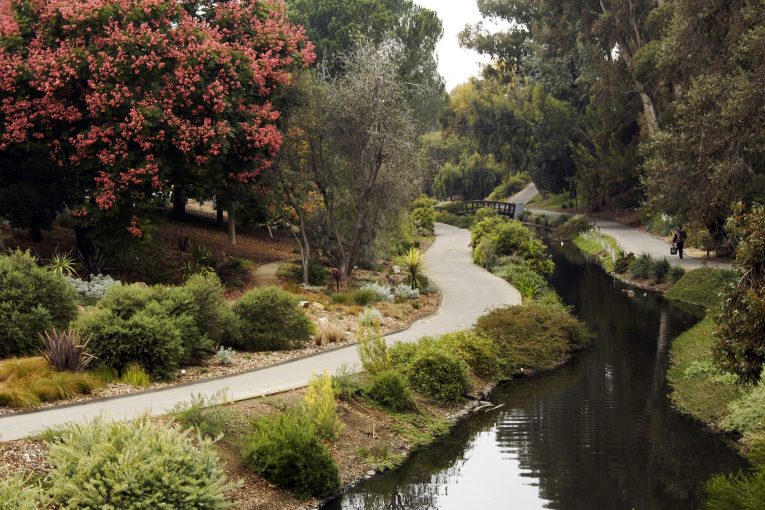

By Diana Zhu
DAVIS – On Tuesday, the UC Davis Arboretum and Public Garden (APG) held the event “Adapting and Growing for the Future” as a part of the ongoing Aggie Alumni Spirit Week.
In complacency with the current COVID-19 pandemic, the event was held over a Zoom conference meeting with around 25 guests in attendance.
Suzanne Ullensvang, the resource development manager of UC Davis’s Arboretum and Public Gardens, introduced speaker Carmia Feldmen, one of the assistant directors, who gave a brief history of the UC Davis APG and quickly outlined the main talking points of the day’s event – the opportunities and challenges the UCD APG have been facing since the pandemic, and the ongoing, new and upcoming projects the APG have.
Feldmen talked about how important the public gardens had become, being one of the few open public gardens across the nation.
The UC Davis APG came to the realization that people were going to keep coming, and therefore, took the initiative to place informative COVID-19 precaution signs, suggesting for six feet social distancing and mask-wearing and allowed staff to wear neon shirts suggesting others to stay six feet away.
This example inspired other public gardens across the nation to take precautions, such as the Arnold Arboretum of Harvard University.
Feldman spoke about how they have taken the steps to help erect tents for classes that still need to meet in person, as most classes are now online, if the weather permits.
Feldmen passed the stage to Andrew Fulks, another assistant director, who spoke on the ongoing, new and upcoming projects the UC Davis APG has in store.
Fulks spoke on many of their projects’ focuses on making the arboretum and public gardens more ADA accessible by creating more accessible paths, railings and ramps.
Feldmen named projects, such as the Arboretum GATEway Garden, the La Rue Bridge, accessibility to the UC Davis Veterinarian school, the Elizabeth Mary Wolf Environment Learning Center, Wyatt Deck, the Arboretum Waterway and a pavement project called the Yellow Brick Road, which connects public spaces instead of traveling across landscaping.
The Arboretum GATEway Garden has already begun to take initiatives towards making the roads more accessible and landscaping.
The La Rue Bridge Crossway will feature stairs where ramps cannot be, ramps and reconstruction of the bridge so the depth of it will not be as thick as before, opening up the path.
At the UC Davis Veterinarian school, new paths were built to connect with other paths, as the route once required walking across landscaping.
This was also seen as one of the few places where the public could come and still see animals, and instead of banishing visitors, signs were put up, taking this opportunity to explain and educate.
The Elizabeth Mary Wolf Environment Learning Center is an upcoming project made possible by donations.
This center provides office space to the APG staff, restrooms (instead of portable toilets), break rooms and multi-purpose rooms for demonstrations, classes and lectures.
Fulks explained this structure will be factory-built instead of contracted, therein saving money to focus on programs and staffing.
Wyatt Deck, which plans to be finished by the end of 2021, will mostly retain it’s 1960s Bay Area architecture and features, but the structure will have reinforced material and more accessible ADA features.
The Arboretum Waterway has had problems with surface algae.
Even though pumping in recycled water was tried, it was still a stagnant body of water and its residency (due to slow flow) would take a week to circulate, allowing algae to form due to the warm, sunny and nutrient-rich features of Northern California.
The solution was to create new slopes and circulation pumps in the area, removing the concrete walkway rim and adding landscaping to form a more natural body of water, rather than something resembling a swimming pool.
Fulks handed the stage by to Feldmen, who talked about programs, such as Learning by Leading, which allows students to lead teams to take action in real-world issues, like climate change and food shortages.
Another program mentioned by Feldman was Nature Rx, which is an online website created to allow for the public to still connect to nature in a virtual setting through virtual tours and online activities.
Ann Daniel, the president of the APG Friends Support Group, spoke about how teams have stayed connected through Zoom by dedicating virtual connection time.
Daniel also mentioned The Leaflet newsletter that is sent out to the APG Friends Support Group, which will be celebrating its 50-year celebration.
Ullensvang then spoke about the APG Plant Sales, which have been very successful in helping fund APG projects and staff.
But now during the pandemic, with no volunteers and limited staff, the APG had to adapt the Plant Sales to an online website.
Customers will be able to select from over 720 plant types, all propagated at UC Davis, and pick these plants up in person.
Once the site launches, only members will be able to purchase, but membership will be free.
Garth Lindley, director of development, then concluded the event by speaking about the UC Davis comprehensive campaign, which hopes to ensure the funds for the continuation of these projects, the gardens, collections and more.
Feldman closed off by showing a video featuring two UC Davis alumni who spoke on their experiences in APG’s Learning by Leading, and how this program has affected their lives.